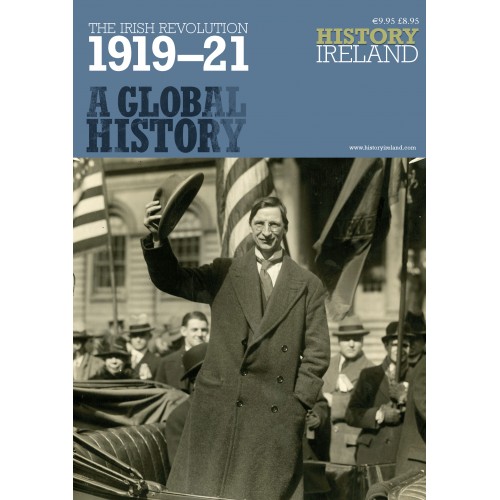Review—The Irish Revolution: 1919-21, A Global History
 There is a quote often attributed to Woodrow Wilson: ‘I not only use all the brains that I have, but all that I can borrow’. Wilson and his 14 points loom large over The Irish Revolution: 1919-21: A Global History, and it’s gratifying to see that the compilers of the volume took his advice.
There is a quote often attributed to Woodrow Wilson: ‘I not only use all the brains that I have, but all that I can borrow’. Wilson and his 14 points loom large over The Irish Revolution: 1919-21: A Global History, and it’s gratifying to see that the compilers of the volume took his advice.
Editors Tommy Graham and Brain Hanley and commissioning editors Fearghal McGarry and Enda Delaney have produced an engaging global history of the Irish Revolution, the third of History Ireland’s stand-alone supplements covering the ‘Decade of Centenaries’. Comprised of brief essays from 23 different contributors, the work crosses the globe and a number of genres of historical writing along its way. Biographies, case studies and more conceptually focused essays create a welcome blend of tone and style which encourages the reader. The essays in the volume are organised thematically. A section on ‘Propaganda and Press’ leads from a discussion of globe-trotting writers into the next section on ‘Diasporas’, this is emblematic of a lightness of touch from the editors, and the volume “reads through” in a way that edited collections often fail to. Highlights include Roisin Healy’s account of the brief divergence of Ireland and Poland and Margaret Ward’s excellent essay on Hanna Sheehy Skeffington, which demonstrates how the personal may be made both political, and internationally relevant.
As a work of public history, it is readable but sophisticated. For this feat alone, the editors and contributors are deserving of much praise. The broad history-reading public who are this volume’s target demographic will doubtless find much of interest in these essays, but what does it offer the global historian? As Enda Delaney notes in his introduction, global history offers us a perspective through which we may better consider ‘Ireland’s place in a newly reconfigured western world, where empires were now in irreversible decline.’ If there is a single predominant theme across 1919-21: A Global History it’s that a global approach has the ability to add depth to, and to re-contextualise, national histories. This is quite the opposite of the broad brushstrokes for which it is often criticised.
Going further, Fearghal McGarry highlights that the work seeks to ‘reverse the nation-state bias by prioritising investigation of how interaction across national boundaries shaped Ireland’s revolution.’ Indeed, it offers a well-rounded, global account of a revolution which has too often been historiographically locked inside a national context. Since David Fitzpatrick’s seminal study of provincial violence in County Clare written in 1977 (Politics and Irish life, 1913-1921), Irish history has valued the localised case study more than many other national historiographies have done. As such, 1919-21: A Global History poses the question: does a wider focus on transnational or global history mark a paradigm shift in our thinking? In our post-Brexit reality, it is interesting to note that many of the essays consider the lasting impact of Wilson’s 14 points and are eager to explore the significance of supranational governance strategies after the First World War. The place of the small nation in international relations is a touchstone in the volume. Perhaps, then, these essays speak to a change in the coming years, and in future we might see Irish historiography drift towards mainland Europe’s embrace, further away from British influence.
Many of the essays traverse transnational subjects. In vogue at the moment, there is a danger that an all-encompassing approach to transnational history will deprive the method of any real meaning. If we as global historians are to usefully employ it, we must demark the territory between what is transnational and what is either comparative or simply an account that crosses a border. The essays in this volume, however, employ a sharp focus and invite us to consider the space which exists between or beyond national borders. To take one example, the women of the Irish Women’s Franchise League covered by Maurice Casey sought to ‘transcend traditional gender roles’ in part through their connections with Russia. The international links between these women helped to advance a shared conception of gender equality, but this extends beyond the simple transmission of ideas between two nations. Rather, it speaks to an attempt to foster a universal socialist ideal of womanhood; it is the creation of transnational identity as much as it is an account of the actions of Irish women. In so doing, this approach informs our understanding of the truly global nature of elements of the Irish Revolution, revealing the rationale behind the gendered demands of the Revolution. This beneficial use of transnational methodology is representative of the work as a whole, in which the global approach to the history of the Revolution informs our understanding of its material reality within Ireland itself. 1919-21: A Global History reveals the many networks that influenced and communicated the Irish Revolution to the world, and the volume’s histories of interconnectedness refute the charge of parochialism which is sometimes levelled at Irish historians and their interpretations of this history.
The volume’s editors have successfully reframed the Irish Revolution within an international context. Their work allows the reader to understand the global dimensions of the Revolution, but more than this, it invites us to challenge some of the orthodoxies that have long governed Irish historiography’s scope and orientation.
Dexter Govan
1919-21: A Global History is available for one-off purchase at €9.95 at
wordwellbooks.com/index.php?route=product/product&product_id=1881